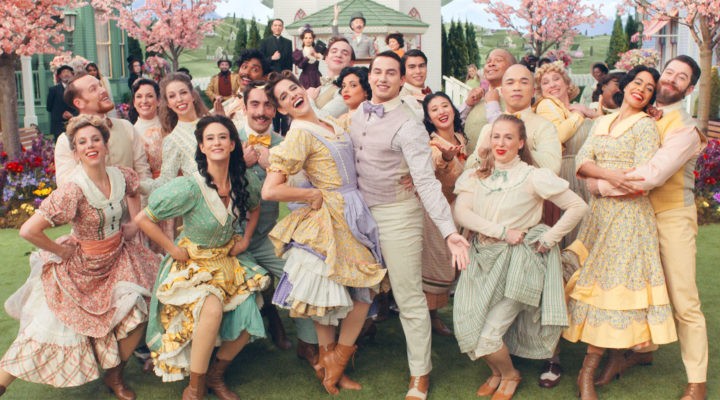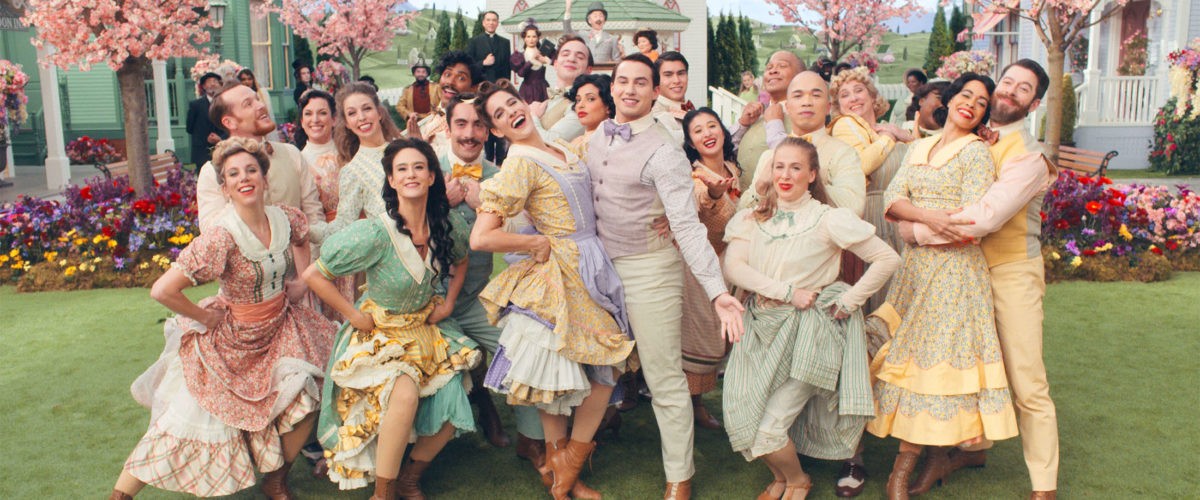My gal loves corn puddin’
She eats it constantly
Sometimes I get to wondering
Does she love it more than me?
My guy loves corn puddin’
I got the recipe
So if he wants my puddin’
He’ll have to marry me.
You put the corn in the puddin’
And the puddin’ in the bowl,
You put the bowl in the belly
’Cause it’s good for the soul.
This song sounds better than it reads. Apple TV’s Schmigadoon! tells the story of Melissa (Cecily Strong) and Josh (Keegan-Michael Key), two mid-career New York City doctors whose relationship is in a slump. They decide to go camping — a questionable attempt to rekindle any spark. They get lost and wind up in a small-town square. An invisible orchestra swells, and a cast of singing, dancing, smiling townsfolk welcomes them to Schmigadoon, “where the sun shines bright from July to June, and the air’s as sweet as a macaroon.”
Josh and Melissa are trapped. They can go home only if they find true love. Josh explains, “It’s like if The Walking Dead were also Glee.”
The creators of Schmigadoon!, Cinco Paul and Ken Daurio, are members of the Church of Jesus Christ of Latter-day Saints. While the show is a charming, affectionate parody of 1940s musicals, it also speaks to the church’s need to engage the world. The church in Schmigadoon deals with the tension between being a sanctuary from sin and a shelter for sinners. Is the church a retreat deep in the woods or a free musical playing in the city park?
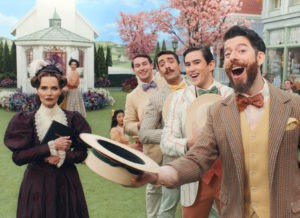
Mildred Layton (Kristen Chenowith) with backup singers from the Schmigadoon barbershop quartet.
Mildred Layton (Kristin Chenoweth), the head of the local morality police, tries to stop everything and everyone who does not live up to her standards. She leads “Mothers Against the Future” — a significant group in many churches. She does not want outsiders “contaminating our town with their urban ways.”
Mildred sings about the fears she has for the town she loves. (Her great-great-granddaddy founded Schmigadoon when he came upon the beautiful land and said, “They’ll never find us here.”)
She waves her Bible as she warns of
passed-out drunks in the gutter …
loose women and hooch-happy sinners …
Promiscuity and depravity
Interlopers interloping …
She defends her approach when she sings:
Now I’ve got nothing against outsiders
Provided they’re the right kind of people,
The kind of folks who look and talk and act like us …
Not loud-mouthed trash with their tommyrot and flapdoodle
Claptrap and fiddle-faddle and jiggery-pokery
She foresees a time of
neon signs, smoke-filled rooms,
Billiard parlors and painted ladies …
The devil himself, dancing on your front porch …
Cows and sheep having amorous congress.
She leads the townspeople in this cheery chorus:
Oh, we’ve got strife! (Got strife!)
And tribulation! (Tribulation!)
And not to mention miscegenation (That sounds bad!)
Let’s pray the Lord (Pray the Lord!) will save us soon (Save us soon!)
(’Cause we’ve got strife and tribulation in Schmigadoon!)
Mildred’s husband, Reverend Layton (Fred Armisen), does not believe the church should be given to judgment, but to love. He tells Josh, “The Good Book has something to say about that. True love bears all things, believes all things, hopes all things, endures all things. In other words, it’s a lot of work. It’s probably not something you find. It’s probably something that you make.”
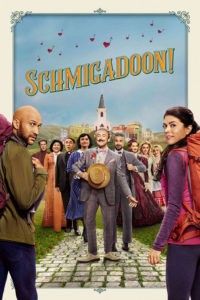 Most people are looking for true love, but churchgoers and non-churchgoers do not always understand that they can help one another find it. Non-church people remind the church that our differences are a gift from God.
Most people are looking for true love, but churchgoers and non-churchgoers do not always understand that they can help one another find it. Non-church people remind the church that our differences are a gift from God.
In a moment of grace, Melissa tells Mildred, “I know what it’s like to want to fix everyone around you because you think that’s the only way to be happy, but it’s not. You have to learn to let go.”
The outsiders teach the people of Schmigadoon what it means to live in a complicated world, while Schmigadoon teaches Melissa and Josh the joy of a single focus. The outsiders had to leave their harried lives in Manhattan because they needed to be reminded that love is more important than success. They need to let love change them into better partners.
The townspeople lead Josh to this conclusion: “We can’t just run away from the people we love because they’re not perfect.”
In the final scene, everyone sings:
This is how we change
Reimagine, rearrange,
See ourselves through others’ eyes,
We stretch,
We hopе,
We reach,
We try,
Two hearts meet,
Both change direction.
Life, at its best, is musical. When we feel something too deeply to just talk about it, we sing about it. We should sing it together.
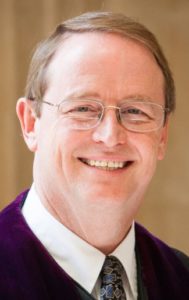
Brett Younger
Brett Younger serves as senior minister at Plymouth Church in Brooklyn, N.Y.

